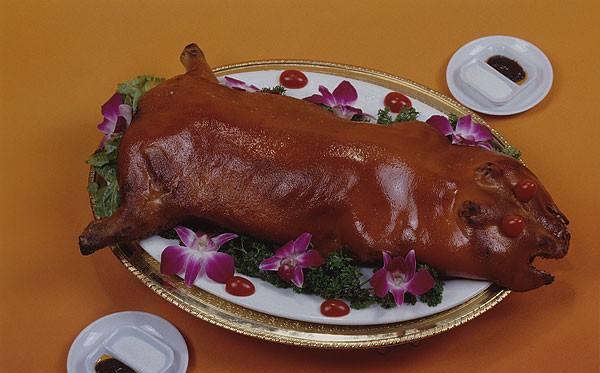Libo wind pig is a specialty of the Libo Buyi ethnic group in Guizhou. Libo wind pig is a famous high-end traditional food with Qiannan flavor, and has been a tribute to the feudal dynasty in history. Libo wind pig has a beautiful shape, bright color, crispy skin and crispy meat, delicious and delicious, edible but not greasy, and can be stored for a long time, is a precious food for entertaining guests and friends, gifting relatives and friends.
The area is Guizhou Libo Buyi ethnic region

First, the production method
raw material
Ingredients: 1 local black piglet (10 kg)
Seasoning: 500 grams of salt, ginger pieces, garlic grains, peppercorns, star anise, sand kernels, 100 grams of rock sugar, 200 grams of sesame oil, 300 grams of glutinous rice wine.
steps
1. Slaughter pigs to bleed, wash the hair with boiling water, use a razor to trim off the fine hairs, cut out the internal organs by caesarean section, leave the head, hooves, remove the hoof shell, open the skull and spine in half, take out the brain marrow and spinal cord, and dig out the eyeballs.
2. Grind the fire salt, peppercorn grains, star anise, sand kernels, rock sugar into a fine minced, mix with salt, evenly wipe the pig's inner cavity, put it into a large vat and marinate for a day and a night, pour the glutinous rice liquor into the vat to submerge the pork, cover and soak for 20 days. Take out the bamboo slices to prop the pork open, bask in the sun for a week, and when the meat is dried to a pepper chestnut color, apply a layer of vegetable oil inside and out, and air dry.
3 The fat piglet is slaughtered, cleaned, and the skull and spine are cut into two pieces, the brain marrow and spinal cord are removed, and the eyeballs are dug out. The fire salt, cloves, white root, fine spices, cinnamon, peppercorns, ginger, tangerine peel into a fine minced, mixed with fine salt, evenly smeared through the pig's inner cavity, put into a large vat to marinate for a day and a night, pour the glutinous rice wine into the tank, submerge the pig, cover and soak for 10 days. Take it out, use bamboo slices to prop open the belly of the pig, dry it for a week, apply a layer of vegetable oil or sesame oil on the inside and outside, and air dry. When eating, take the meat in an appropriate amount, cut into pieces and seasoning and steam, or cook with vegetables and vegetables, the taste is good.
Second, the flavor characteristics
1. According to the Qing Dynasty's "Records of Libo County", "The piglets in this county are particularly fat and tender, and the wind pigs are famous for roasting pigs." As a local specialty, best-selling at home and abroad, Hong Kong Daya Company once hung a wind pig indoors, after several months of cold and summer changes, not only the meat is as tender as ever, but also the aroma is endless, causing foreign businessmen to compete for it.
2. Libo wind pig is during the winter solstice to spring, the piglet is slaughtered, the whole pig is pickled and dried, so it is named. It is beautifully shaped, with its front legs stretched flat, its hind legs bent, and its head tilted to one side, like a sleeping live pig.
3. The wind pig has a yellow and bright color and an abnormal fragrance. Hang it indoors, and over the course of several months, the meat remains unchanged, tender as ever, and the aroma is endless. This delicacy is tender and has a flavor that outweighs that of pork, making it a famous dish for high-end feasts. A valuable gift for relatives and friends. [2]
Third, the process is critical
1. Leave three fingers wide in the middle of the spine, so that you can focus when hanging.
2. When the wine is brewed, turn it over once every two days to make the meat taste evenly. Bask in the sun without fly stinging.
Fourth, product honor
Wind Pig has participated in the Canton Fair exhibition and sales for many times, and has been welcomed by foreign investors and is known as "kitchen treasure". Products are exported to Europe, India, Japan and Southeast Asia and other countries and regions. Deng Ge Libo Wind Pig is the only trademark brand registered by the State Administration for Industry and Commerce in Libo, and its production history dates back more than 120 years.